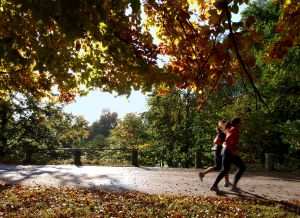Move, move, move...
Researchers have known for years that people who are active and trim are less likely to develop cancer. And survivors who exercise and keep a healthy weight are less likely to relapse.
Only recently, however, have scientists begun to untangle how staying active helps keep cancer at bay.
While exercise may not change the inner workings of a tumor cell, physical activity may change the cell's neighborhood — the surrounding tissue, blood vessels and immune cells — known as the "microenvironment," says Patricia Ganz, a breast cancer specialist at UCLA's Jonsson Comprehensive Cancer Center.
"It's a new frontier for cancer research," says Pamela Goodwin, professor of medicine at Mount Sinai Hospital, University of Toronto.
Healthy neighborhoods are as important to cells as they are to children, says William Li, president of the Boston-based Angiogenesis Foundation, which funds research in cancer and other diseases.
He compares a lone tumor cell to a "bad kid" living in a good neighborhood. Even an aspiring juvenile delinquent won't be able to cause much trouble if he's surrounded by watchful parents, neighbors and local police. Exercise helps improve the neighborhood, keeping cancers in check, Li says. Failing to exercise — and putting on a lot of weight — damages the neighborhood, making it easier for cancers to wreak havoc.
In particular, exercise helps to prevent chronic inflammation, a process that can fuel cancers by changing the neighborhood around a tumor cell. Exercise helps lower levels of both insulin and sex hormones, such as estrogen, which release growth factors that let tumor cells survive and spread, Li says. And, as Doria has learned, exercise also helps relieve psychological stress, which may further reduce inflammation, Ganz says."
Read full article here.
~ Be Well! ♥

